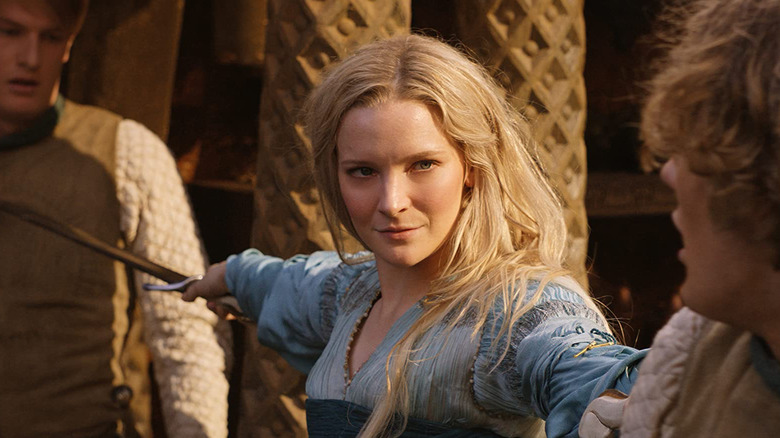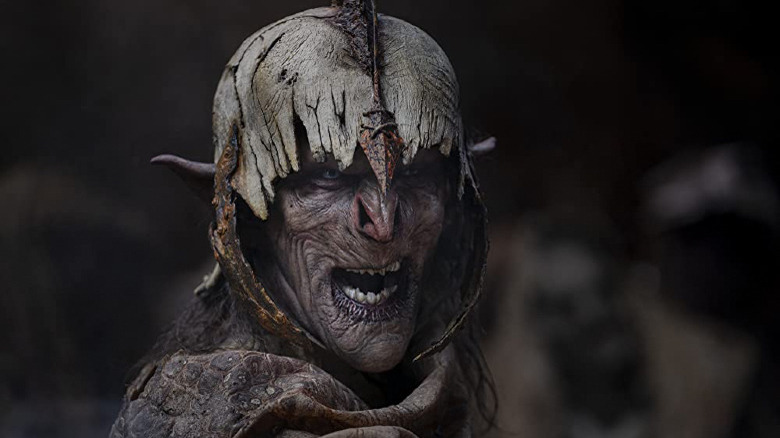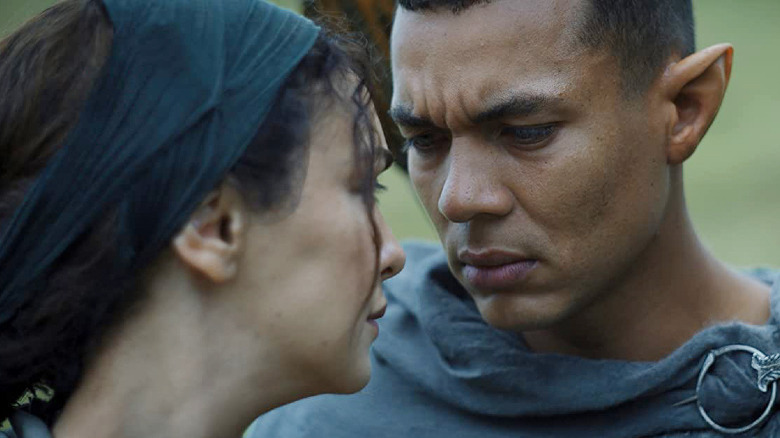The Alternate Lord Of The Rings TV Shows That HBO, Netflix, And The Russo Brothers Wanted To Make
One does not simply go back to Middle-earth after Peter Jackson's "The Lord of the Rings" and "The Hobbit" film trilogies grossed more than $5.8 billion (with a "b"), forever changing the fantasy genre. Amazon's quest to make its own J.R.R. Tolkien series, "The Lord of the Rings: The Rings of Power," was no stroll into Mordor either. The company had to fend off fierce bids from its many competitors in the ongoing streaming wars just to secure the rights to the show to begin with — and even then, it only gained access to a fraction of the literature Tolkien wrote about his fantastical creation and its long, long history.
After Amazon paid an unfathomable amount of cash to the Tolkien estate to make "The Rings of Power" (enough to build a pile of money even Smaug the dragon would feel comfy sitting on), rumors began to circulate about what, precisely, the series would entail. In fact, you may recall there were reports claiming the series would focus on a young Aragorn as far back as 2018. Co-showrunners J.D. Payne and Patrick McKay have since confirmed this was more than mere scuttlebutt, revealing that Amazon was pitched just about every spin-off under the sun.
In time, Amazon would settle on Payne and McKay's idea for a show about Middle-earth's Second Age and the much larger story that Jackson's "The Fellowship of the Ring" movie alludes to in its (pretty dang awesome) prologue. But exactly how close did the likes of HBO and Netflix come to securing a deal with the Tolkien estate? And what were some of the alternate TV shows pitched by other creatives? Thanks to an extensive new interview with Payne and McKay, we finally have some answers to those questions.
To Marvel or to remake?
With "The Rings of Power" season 1 nearing its end and production on season 2 already underway, The Hollywood Reporter has posted an in-depth look at the arduous process behind the show's development (along with its share of hints at what's to come next). Among the many fascinating insights in the article is a tidbit from THR's sources asserting that, contrary to earlier reports, Amazon did not pay $250 million to the Tolkien estate to make the series. That number was actually Netflix's bid, with Amazon having forked over "tens of millions less" (but still a massive amount) to close the deal. "It was our collective passion and fidelity to Tolkien that really won the day," Amazon Studios TV co-head Vernon Sanders told THR.
Sure, Jan.
Okay, in all fairness, there's more truth to that than you might think. The Tolkien estate was notoriously unhappy with the liberties Jackson took when adapting "The Lord of the Rings" and "The Hobbit," so much so it required a lot more than money to win them over (not least of all with every major streamer in town trying to out-bid one another anyway). THR's sources describe Netflix's vision as "the Marvel approach," with pitches for solo series centered on Gandalf the Grey and Aragorn. Based on their reaction to Jackson's spectacle-driven take on Tolkien's books, which devote a whole lot more pages to characters walking and singing songs than fighting, it's no wonder "that completely freaked out the estate," as one THR insider put it.
At the same time, the Tolkien estate had little to no interest in retreading Jackson's steps. Hence, HBO failed to gain much traction after pitching them a series that would, in essence, re-imagine the events of Jackson's films and their portrayal of Middle-earth.
An Aragorn show and a Shakespearean take
One of the big points THR emphasizes in its article is that Payne and McKay were easily underdogs when it came to pitching their idea for a "Lord of the Rings" TV show. It's not that they lacked experience, having written an early script draft for what would later become "Star Trek Beyond" and worked on the "Flash Gordon" reboot that Taika Waititi is currently attached to direct. But with no official credits to their name, they were, as McKay told the outlet, "the dark horse candidates" going up against people who "on paper would be more suited to the gig."
Among their competitors were the Russo Brothers, who wanted to make a show that returned to Middle-earth's Third Age — the era covered in "The Lord of the Rings" and "The Hobbit" — but centered on Aragorn. (Not to drag them more than they deserve, but that certainly sounds like the sort of vanilla pitch we've grown accustomed to from the "Avengers: Endgame" directors.) Among the other strong contenders was Anthony McCarten, who had what THR describes as being a "Shakespearean take." It's a somewhat vague but intriguing description on its own, if less so when you recall McCarten is one of the writers behind the modern cottage industry of hackneyed biopics like "Bohemian Rhapsody."
In the end, it was the least well-known people in the room who landed the job of bringing Middle-earth back to our screens. Judging by the passionate responses to "The Rings of Power," be they the disdainful bad faith reactions from toxic fans or the ardent defenses of the show's bigger swings (yes, I'm Team Galadriel), it seems they may've been the right choice after all.
New episodes of "The Rings of Power" premiere on Fridays on Prime Video.


